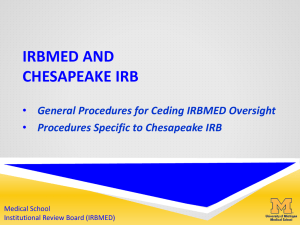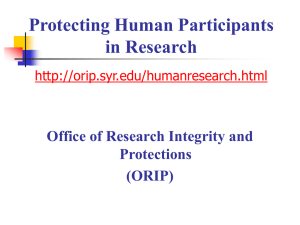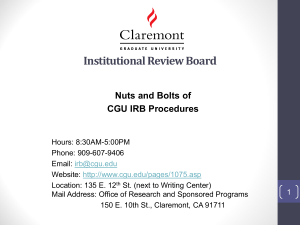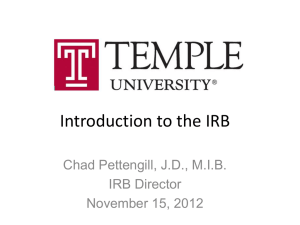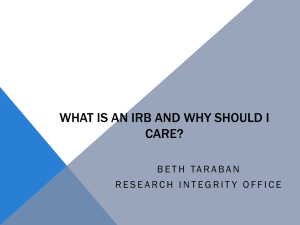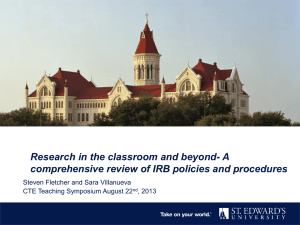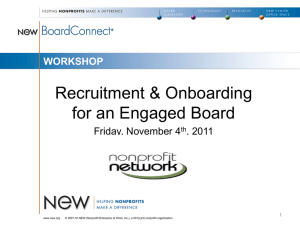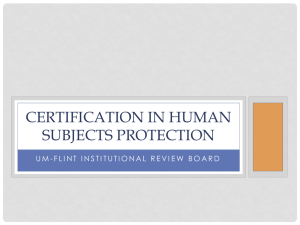Ceding IRB Oversight
advertisement
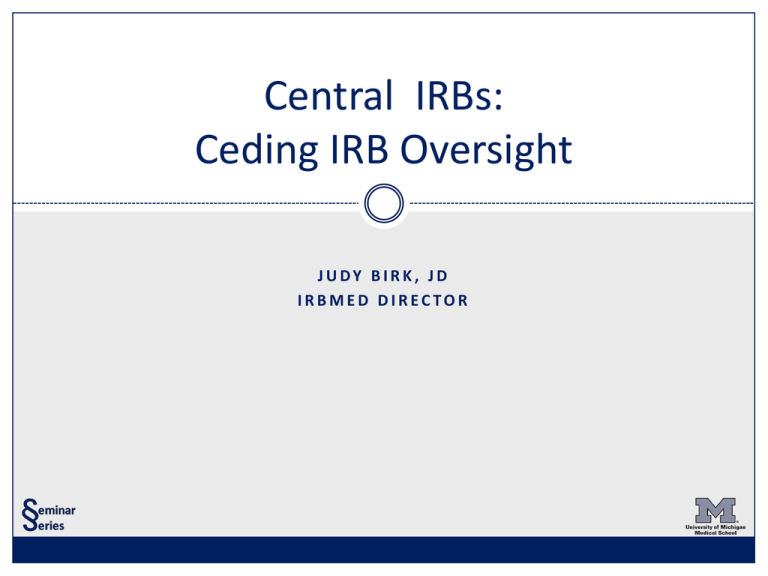
Central IRBs: Ceding IRB Oversight JUDY BIRK, JD IRBMED DIRECTOR Presentation Outline Defining and explaining a Central IRB IRBMED ceding oversight Focus on commercial IRBs IRBMED accepting oversight Brief information Brief FAQs What is a Central IRB? A single IRB Provides regulatory and ethical oversight for research conducted by one or more institutions not otherwise affiliated with it Per specific agreement, it becomes the IRB of Record for oversight of the research at all sites Establishing the Relationship Federal regulations allow FWA-holding IRBs to enter into joint review agreements to reduce regulatory burden Central IRBs may be Independent (commercial) Academic Agreements may also be called Reliance Agreements Cooperative Agreement IRB of Record Agreements Master Service Agreements IRB Authorization Agreements (IAA) – OHRP terminology Common Scenarios for Use of Central IRBs Multi-site studies Industry-sponsored Federally-sponsored Time-sensitive studies Public health emergency such as flu Specialized IRB expertise is necessary Special populations Specialized reviewers Potential Benefits Eliminates full, duplicative review across sites Reduces variability of the study parameters across sites Decreases cumulative review time Decreases burdens on local IRBs Costs are reduced locally and perhaps for the study as a whole Perceived Challenges Quality and thoroughness of review How well do you know the central IRB? Consideration of local context How well does the central IRB know you? Apportionment of institutional liability How will problems be managed? Managing ‘shared’ control and accountability Who will perform certain functions? Agreeing to different standardized procedures New workflows may be necessary Misperceptions Ceding oversight lets PIs avoid IRBMED, ORSP, CRAO, COI, and other ancillary committees WRONG! Only IRBMED oversight is ceded. The regulatory oversight will be different with another IRB WRONG! All IRBs follow the same regulatory authority. All Central IRBs have the same process WRONG! Each IRB has their own process for applying. Ceding to a Central IRB Collaborating institutions complete the agreement document Roles and responsibilities are apportioned FWAs are amended, if necessary (OHRP) Assure all internal institutional documents are in alignment with the arrangements Informed consent template language is finalized Does not require OHRP or FDA signature or approval IRBMED Ceding Parameters for Central (Commercial) IRBs All requests are evaluated on a case-by-case basis. Parameters: Multi-site Industry-sponsored Federally-sponsored (rare) Phase II, III, and IV U-M must not be a coordinating center NCI-CIRB clinical trials (all phases) Finalized IRBMED Agreements - Ceding Ceding oversight Single academic institutions Independent (central/commercial IRBs) Schulman Associates IRB Western IRB (WIRB)/Copernicus IRB Chesapeake IRB Quorum Review IRB NCI CIRB Generally, an IRB must be accredited or well-known to U-M before IRBMED will cede IRB oversight Who May Request to Cede Oversight? Sponsor CRO External Institution / Individual Grant/award U-M PI Application Process Study teams create a Clinical Trial Routing Form (CTRF) in eResearch Proposal Management (eRPM) Select the Central IRB (check with IRBMED if the IRB is not listed) In eResearch Regulatory Management (eRRM), complete the “Requesting Review by a Non-UM IRB” (“Ceding”) application. The Ceding application is routed to/reviewed by the ancillary committees The Ceding application is reviewed and acknowledged by IRBMED Ongoing PI/Study Team Obligations at U-M Amendments must be submitted for any Changes to the U-M study team membership Changes to the research impacting ancillary committee reviews COI CRAO Investigational Pharmacy RDRC/SHUR Changes to research may impact IRBMED’s decision to cede the project to the central IRB Noncompliance of the Central IRB Ongoing PI/Study Team Obligations at U-M AE/ORIO reports must be submitted if: Related, serious adverse events occur in U-M subjects Unanticipated problems occur in U-M subjects Serious and/or continuing non-compliance determinations are made regarding U-M participation The study is placed on hold or suspended Ongoing PI/Study Team Obligations at U-M Continuing reviews or termination reports The research study continues to be approved at the Central IRB The research study is terminated at the Central IRB IRBMED Agreements-Accepting Accepting oversight Single academic institutions Single non-academic sites (e.g., private medical practice) Single individuals (e.g., a consultant on a study) Generally, the studies/roles of the individual at the external institution are of lower risk IRBMED is Accepting Oversight *PI/Study Team Actions Contact IRBMED Application to Request IRBMED Oversight Provides details about the roles/responsibilities and the relationship Identify the collaborators in eResearch Complete any additional documentation requested by IRBMED Work with IRBMED to obtain/provide any additional documentation to/from the external site/individual IRBMED is Accepting Oversight *IRBMED Actions Collect documentation from PI/Study team Review ‘Application Requesting IRBMED Oversight’ Consult with IRBMED Directors and UMOR (formerly OVPR) Pre-screening to resolve outstanding questions Seek approval from IRBMED co-Chairs and other designated officials UMOR reviews the request and signs the agreement External institution signs Agreement is uploaded into eResearch IRBMED as a Central IRB? IRBMED as a Central IRB for multi-site research is under consideration FAQs for Ceding to a Central IRB Q: How long does the application review process take at IRBMED? A: If all agreements are in place, review of the ceding application received by IRBMED should take approximately 2 business days. Q: Do I use the IRBMED consent or the sponsor’s consent? A: Generally, you will use the sponsor’s consent that includes U-M required language. FAQs for Ceding to a Central IRB Q: Who pays for the cost of a Central (commercial) IRB? A: Usually, the sponsor does. Q: I am a U-M sponsor-investigator of a research study – may I use a Central (commercial) IRB? A: No, not at this time. Resources NIAID Research Toolkit OHRP Website IRBMED Website for Central IRBs Questions? Thank you!

